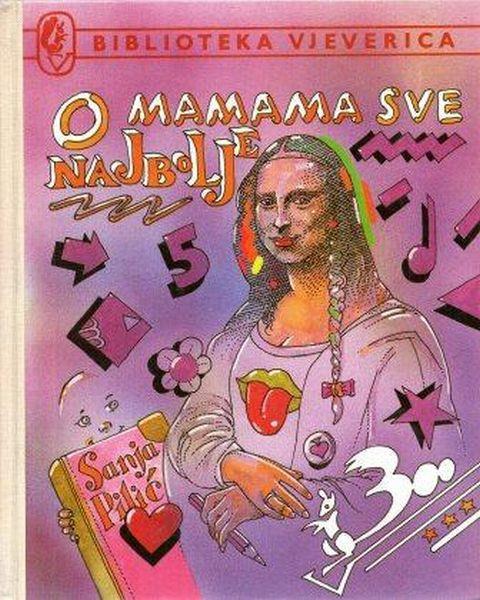4. An interview
When I write for children, I turn into a child
Your beginnings in children’s literature were more than successful. The book All the Best About Mums has remained your most complex novel for children. Since its release, it has been praised and awarded, and today it is on the list of primary school required reading. You probably didn’t expect that when you wrote it. How do you look at it today, after all these years? Do you remember what you were thinking and anticipating when looking for a publisher?
I wrote All the Best About Mums primarily to myself. I was having fun writing and inventing a crazy world I would love to live in. I included real characters in

Sanja Pilić 16
the novel – my children, my ex-husband, my friend Marijana Budak, and my friend Rene Bakalović. We were very close then. I described Caramela as a mum trying to be a good mother and an artist, but it’s hard to do. She’s friendly and absent-minded.
I put a lot of happy events in the novel and brought the hero from Caramela’s story to life. I’ve always dreamed that I could imagine something and that it is then created in reality. Caramela’s fantasy character came to life. Wonderful! In this novel, the novel itself is also alive and thinking about its future. I was happy to write it. It’s very surreal, even though it has a head and a tail. However, I was hesitant when I had to take it to my editor, Vera Barić. I was scared. Anyway, one sunny day after I found out that my horoscope was good, and the coin I’d flipped fell to the side that said I had to hand over the manuscript to the publisher, I went to the editor. I breathed deeply again in front of her door and was reluctant to knock on it... Vera Barić was extremely kind, she took the manuscript, and after a month, precisely on my birthday, she told me that she liked the text very much and that she would publish it in Mladost. I was happy. However, the following year, I divorced my husband.
In writing children’s literature, you were a writer of the city; you did not engage in fairy tales or fantastic literature, except a little in All the Best About Mums. How come your interest ended up in this kind of children’s fiction?
I don’t really have a feel for fantasy or fairy tales. I like fairy tales; fantasy bores me out of my wits, even in the movies. I tried to love it, but it didn’t work out. I only like urban fantasy, like in Czech films, for example. No unicorns, witches, Quidditch, power rings, or anything similar. I start yawning. Beauty and The Beast, that sort of thing is OK; that’s a kind of fairy tale I love. Or Doctor Dolittle
I remember that I didn’t even like Alice In Wonderland. I loved The Wizard of
Sanja Pilić 17
Oz. I found writers like William Saroyan, Erich Kästner, and Christine Nöstlinger, those who wrote realistic prose, sometimes with a touch of fantasy, more interesting. I love real flesh-and-blood heroes with skinned knees and a sense of justice.
Your short stories are very popular among children because of their wit, ludic elements, and topics that concern children. And, of course, the point in the last sentence. How long did it take you to hone your seemingly simple style?
I know it’s not easy to write a story like that. Are you already fit when it comes to this, or do you still have to wait for inspiration?
I’m in pretty good shape when writing such short stories. I usually have to be in a good mood and write about the first thing that comes to mind. I’ve written many of them and sometimes wonder how I did it. Even when the motives repeat themselves, the stories are still different. I like them to be funny and fresh, like scattered, colourful candy.
For years you have been one of Croatia’s most read and borrowed children’s authors, and although many children’s writers deal with similar topics, your books are always read and bought more. So far, others have always commented on it, and now I’m asking you – how do you comment on it? At your literary meetings, the little readers are delighted. Can we say that you are a real literary star?
Yes, children like to read my books. I guess it’s because I am immediate, and they can identify with my characters. I don’t write dryly, and I don’t try to be young, but I am young when I write for them. I turn into a girl or a boy in the first person. The sentences are lively. I often describe different characters through dialogue. The heroes are adorable. I fool around with words. I make a
Sanja Pilić 18
nice point. I joke. I have my style. When I’m cranky, I write cranky, funny stories; when I’m romantic, I throw myself into something sweet, pleasant, and cheerful. Sassy. I think they like it.
As an editor of children’s literature, I led the idea of publishing the so-called urban prose. I have often suggested that other authors read your books if they wanted to offer us a new manuscript; I was interested in something like what you wrote. Many listened to me and wrote great novels, often award-winning, but those sales were nowhere near your titles. How do you interpret that?
I don’t know how to explain it. The language is youthful. The rhythm is fast. If I’m philosophising, I’m doing it invisibly. There are not many descriptions, and yet, it seems I manage to evoke the atmosphere in which something is happening. I follow what children are interested in, social networks, Instagram, YouTube, TikTok, etc., but my heroes always live the fullness of a non-virtual life. They celebrate birthdays, visit exhibitions, attend acting auditions, field trips, and concerts, and are independent and compassionate, too. They fall in love. I guess that works. They don’t gossip, and they don’t hate each other. They are usually on good terms with their parents. They’re kind, actually. Maybe that’s the point...
How much influence has foreign and domestic children’s literature had on you?
Fifty-fifty, I think. I loved Kästner, Wilde. Winnie The Pooh by E. Milne was a revelation to me. I adored Christine Nöstlinger’s Konrad or the Child out of the Tin. I loved reading my mother’s stories, especially the ones about Dandelion and Crumb. Then Balog, the poems of Luko Paljetak, and Love or Death by Ivan Kušan was a really cool book for me. I loved Karl May, too. As a child, I would
Sanja Pilić 19
also read the classics. A children’s book made me feel just as happy as a book for grown-ups. They all had a bit of an impact on me. But also movies, children’s series, fairy tales, music, painting... I experienced every kind of art very intensely.
One crucial element in your children’s book is culture as such. In narrative texts, you often mention other writers, books, theatres, bookstores, and cultural institutions in general. Do you do it intentionally and with purpose?
What’s your lead on that?
Today’s children are not very interested in culture, so I introduce it through the back door unobtrusively and acceptably in my books. So, I often set them up with a composer, a painter, or a writer they’ve never heard of, who might be attractive to them. After all, my heroes, no matter what puberty stage they are, have a variety of leisure activities. Through that, I promote sports, acting, photography, journalism, etc., because I think their age is excellent for learning and acquiring new skills. Whenever I’m invited to speak at schools, I also explain to the kids how important it is to be curious, have a hobby, travel and the like.
The children’s characters in your books are not passive bystanders, but, like Maša, in your famous series, they become the corrective factor of adult behaviour. With these stories, which enjoy great popularity, you are telling children that a lot is up to them: the initiative, the desire to improve, making demands and bringing out ideas. Many children do not get it through upbringing, but when they see that the character in the story does it, the child itself begins to change. Do you think that’s the role of a children’s writer?
I don’t know if this is the role of a children’s writer, but the fact is that I consciously chose this role. As a mother of grown children and a grandmother
Sanja Pilić 20
of four grandchildren, no matter how silly my fantasies are and how much I would like to live in a different world, as far as upbringing is concerned, I am pretty old-fashioned. In this sense, I like independent and curious children, lively but decent, who respect the elderly and are initiators of new ideas and actions, even by constantly encouraging parents to new challenges. Maša is such a girl. And many kids love her. I just got back from signing some Maša picture books. One girl named Laura has all twenty of them. But I didn’t have to sign all of them, fortunately…
of the interview)
Sanja Pilić 21
Interview with Sanja Pilić by Zoran Maljković in Republika 78/9-10(2022), p. 3-20 (part
5. List of awards and other distinctions
(1981) Second prize of the Večernji list Award for a short story Ah, ludnica (Ah, the Madhouse)
(1990) Winner of the Grigor Vitez Award for best literary text for young adults for the novel O mamama sve najbolje (All the Best About Mums) Second prize of the Radio Student Award and the magazine Literatura (Slovenia) for radio drama O kome se to radi? (Who is it About?)
(1996) Winner of the Ivana Brlić-Mažuranić Award for the novel Mrvice iz dnevnog boravka (Crumbs from the Living Room)
(2000) Winner of the Ivana Brlić-Mažuranić Award for the book Zafrkancije, zezancije, smijancije i ludancije (Jokes, Gags, Laughs and Banter)

Sanja Pilić 22
(2002) Winner of the Grigor Vitez Award for best literary text for young adults for the novel Sasvim sam popubertetio (Totally Teen)
(2005) Third prize of the Večernji list Award for a short story Muškarci mog
života (The men of my life)
(2008) Winner of the Mato Lovrak Award for the book Što mi se to događa? (What’s Happening to Me?)
(2008) IBBY Honour list diploma for the novel Jesam li se zaljubila? (Am I in Love?)
(2010) Kiklop Award for book of year for children and young adults for the novel Hoću biti posebnaaaaa! (I Want to be Special!)
(2011) Kiklop Award for picture book of the year for the book Maša i gosti (Maša and Guests)
The White Ravens catalogue with the book Hej, želim ti nešto ispričati!
(Hey, I Want to Tell You Something!)
Received the medal of the Order of Croatian Danica with the image of Antun Radić for merits in education
(2016) Winner of the Grigor Vitez Award for best literary text for young adults for the novel Pošalji mi poruku! (Text Me!)
(2017) First prize of the Večernji list Award for a short story Delete Winner of the international The Little Prince Award for the novel Pošalji mi poruku! (Text Me!)
(2017) In National quiz for reading promotion with the novel Pošalji mi poruku! (Text Me!)
(2018) Krešimir Šego Award for the most successful author - writer for young people
(2022) Crikvenica's Sun Award for an encompassing writer's work
Sanja Pilić 23
6. Complete bibliography of the books for children and young people
2023.
Pilić, Sanja. Maša i rođendan (Maša and the Birthday). Illus. Niko Barun. 2nd ed. Zagreb: Mozaik knjiga.
Pilić, Sanja. Maša i zima (Maša and Winter). Illus. Niko Barun, 2nd ed. Zagreb: Mozaik knjiga.
2022.
Pilić, Sanja. E, baš mi nije žao (And I Don't Care!). Illus. Niko Barun. 10th ed.
Zagreb: Mozaik knjiga.
Pilić, Sanja. Hoću biti posebnaaaaa! (I Want to be Special!). Illus. Niko Barun. 12th ed. Zagreb: Mozaik knjiga.
Pilić, Sanja. Hoću biti velik! (I Want to be Big). Illus. Željka Mezić. Zagreb: V.B.Z.
Pilić, Sanja. Maša i Božić (Maša and Christmas). Illus. Niko Barun. 4th ed.
Zagreb: Mozaik knjiga.
Pilić, Sanja. Maša i gosti (Maša and Guests). Illus. Niko Barun. 4th ed. Zagreb: Mozaik knjiga.
Pilić, Sanja. Maša i ljeto (Maša and Summer). Illus. Niko Barun. 3rd ed. Zagreb: Mozaik knjiga.
Pilić, Sanja. Maša i nova prijateljica (Maša and the New Friend). Illus. Niko
Barun. Zagreb: Mozaik knjiga.
Pilić, Sanja. Moj mačak Glupko (My Cat Glupko). Illus. Željka Mezić. Zagreb: V.B.Z.
Pilić, Sanja. O mamama sve najbolje (All the Best About Mums). Illus. Niko Barun. 11th ed. Zagreb: Mozaik knjiga.
Pilić, Sanja. Pošalji mi poruku! (Text Me!). Illus. Niko Barun. 2nd ed. Zagreb: Mozaik knjiga.
Pilić, Sanja. Volim, volim! (I Love, I Love!). Illus. Željka Mezić. Zagreb: V.B.Z.
Sanja Pilić 24
2021.
Pilić, Sanja. Hej, želim ti nešto ispričati! (Hey, I Want to Tell You Something!).
Illus. Niko Barun. 5th ed. Zagreb: Mozaik knjiga.

Pilić, Sanja. Jesam li se zaljubila? (Am I in Love?). Illus. Niko Barun. 11th ed.
Zagreb: Mozaik knjiga.
Pilić, Sanja. Luka voli izmišljati (Luka Loves Making Stuff Up). Illus. Ana Despot.

Zagreb: Mozaik knjiga.
Pilić, Sanja. Maša i bajke (Maša and the Fairy Tales). Illus. Niko Barun.3rd ed.
Zagreb: Mozaik knjiga.
Pilić, Sanja. Maša i izlet (Maša and Excursion). Illus. Niko Barun. Zagreb: Mozaik knjiga.
Pilić, Sanja. Maša i nova učenica (Maša and the New Pupil). Illus. Niko Barun. 4th ed. Zagreb: Mozaik knjiga.
Pilić, Sanja. Maša i putovanje (Maša and a Travel). Illus. Niko Barun. 3rd ed.
Zagreb: Mozaik knjiga.
Pilić, Sanja. Maša i sport (Maša and Sport). Illus. Niko Barun. 2nd ed. Zagreb: Mozaik knjiga.
Sanja Pilić 25
Pilić, Sanja. Maša i učiteljica (Maša and the Teacher). Illus. Niko Barun. 2nd ed.
Zagreb: Mozaik knjiga.
Pilić, Sanja. Maša i zima (Maša and Winter). Illus. Niko Barun. Zagreb: Mozaik knjiga.
Pilić, Sanja. Maša i životinje (Maša and the Animals). Illus. Niko Barun. 4th ed.
Zagreb: Mozaik knjiga.
Pilić, Sanja. Mrvice iz dnevnog boravka (Crumbs from the Living Room). Illus.
Dario Kukić. 10th ed. Zagreb: Alfa.
Pilić, Sanja. Nema problema (No Problem). Illus. Dario Kukić. Zagreb: Alfa.
Pilić, Sanja. Nemam vremena (I Don't Have Time). Illus. Robert Graffius. 7th ed.
Zagreb: Alfa.
Pilić, Sanja. Priče smijalice (Laughing Stories). Illus. Niko Barun. Zagreb: Mozaik knjiga.
Pilić, Sanja. Što cure govore? Što dečki govore? (What Girls Say? What Boys Say?). Illus. Niko Barun. 10th ed. Zagreb: Mozaik knjiga.
Pilić, Sanja. Što mi se to događa? (What’s Happening to Me?).Illus. Niko Barun. 10th ed. Zagreb: Mozaik knjiga.
Pilić, Sanja. Zar baš moram u školu? (Do I Really Have to go to School?). Illus. Niko Barun. 11th ed. Zagreb: Mozaik knjiga.
2020.
Pilić, Sanja. Hoću biti posebnaaaaa! (I Want to be Special!). Illus. Niko Barun. 11th ed Zagreb: Mozaik knjiga.
Pilić, Sanja. Hoću i ja! (Me, too!). Illus. Niko Barun. 9th ed. Zagreb: Mozaik knjiga.
Pilić, Sanja. Zafrkancije, zezancije, smijancije i ludancije (Jokes, Gags, Laughs and Banter). Illus. Branka Hollingsworth Nara. 3rd ed. Zagreb: Školska knjiga.
Sanja Pilić 26
2019.
Pilić, Sanja. Ideš mi na živce! (You're Getting on My Nerves!). Illus. Niko Barun. 4th ed. Zagreb: Mozaik knjiga.
Pilić, Sanja. Mama, nemoj me gnjaviti! (Mom, don't bother me!). Illus. Niko Barun. Zagreb: Mozaik knjiga.
Pilić, Sanja. Maša i film (Maša and a Film). Illus. Niko Barun. Zagreb: Mozaik knjiga.
Pilić, Sanja. Maša i zoološki vrt (Masha and the Zoo). Illus. Niko Barun. Zagreb: Mozaik knjiga.
Pilić, Sanja. Miš Pero i mačka Liza (Mouse Pero and Cat Lisa). Illus. Andrea Petrlik Huseinović. Zagreb: Dječja knjiga.


Pilić, Sanja. Sasvim sam popubertetio (Totally Teen). Illus. Niko Barun. 11th ed.
Zagreb: Mozaik knjiga.
Pilić, Sanja. Zar baš moram u školu? (Do I Really Have to go to School?). Illus. Niko Barun. 10th ed. Zagreb: Mozaik knjiga.
Sanja Pilić 27
2018.
Pilić, Sanja. Maša i maškare (Maša and the Carnival). Illus. Niko Barun. Zagreb: Mozaik knjiga.
Pilić, Sanja. Maša i muzej (Maša and the Museum). Illus. Niko Barun. 2nd ed.
Zagreb: Mozaik knjiga.
Pilić, Sanja. Maša i nova učenica (Maša and the New Pupil). Illus. Niko Barun. 3rd ed. Zagreb: Mozaik knjiga.
Pilić, Sanja. Maša i rođendan (Maša and the Birthday). Illus. Niko Barun. Zagreb: Mozaik knjiga.
Pilić, Sanja. Maša i životinje (Maša and the Animals). Illus. Niko Barun. 3rd ed.
Zagreb: Mozaik knjiga.
Pilić, Sanja. Mrvice iz dnevnog boravka (Crumbs from the Living Room). Illus. Dario Kukić. 9th ed. Zagreb: Alfa.
Pilić, Sanja. O mamama sve najbolje (All the Best About Mums). Illus. Niko Barun. 10th ed. Zagreb: Mozaik knjiga
Pilić, Sanja. Sasvim sam popubertetio (Totally Teen). Illus. Niko Barun. 10th ed.
Zagreb: Mozaik knjiga.
Pilić, Sanja. Što cure govore? Što dečki govore? (What Girls Say? What Boys Say?). Illus. Niko Barun. 9th ed. Zagreb: Mozaik knjiga.
Pilić, Sanja. Što mi se to događa? (What’s Happening to Me?). Illus. Niko Barun. 9th ed. Zagreb: Mozaik knjiga.
Pilić, Sanja. Vidimo se na fejsu! (See You on Facebook!). Illus. Niko Barun. 6th ed. Zagreb: Mozaik knjiga.
2017.
Pilić, Sanja. Jesam li se zaljubila? (Am I in Love?). Illus. Niko Barun. 10th ed.
Zagreb: Mozaik knjiga.
Pilić, Sanja. Maša i bajke (Maša and the Fairy Tales). Illus. Niko Barun. 2nd ed.
Zagreb: Mozaik knjiga.
Sanja Pilić 28
Pilić, Sanja. Maša i Božić (Maša and Christmas). Illus. Niko Barun. 3rd ed.
Zagreb: Mozaik knjiga.
Pilić, Sanja. Maša i putovanje (Maša and a Travel). Illus. Niko Barun. 2nd ed.
Zagreb: Mozaik knjiga.
Pilić, Sanja. Maša i selo (Maša and the Village). Illus. Niko Barun. Zagreb: Mozaik knjiga.
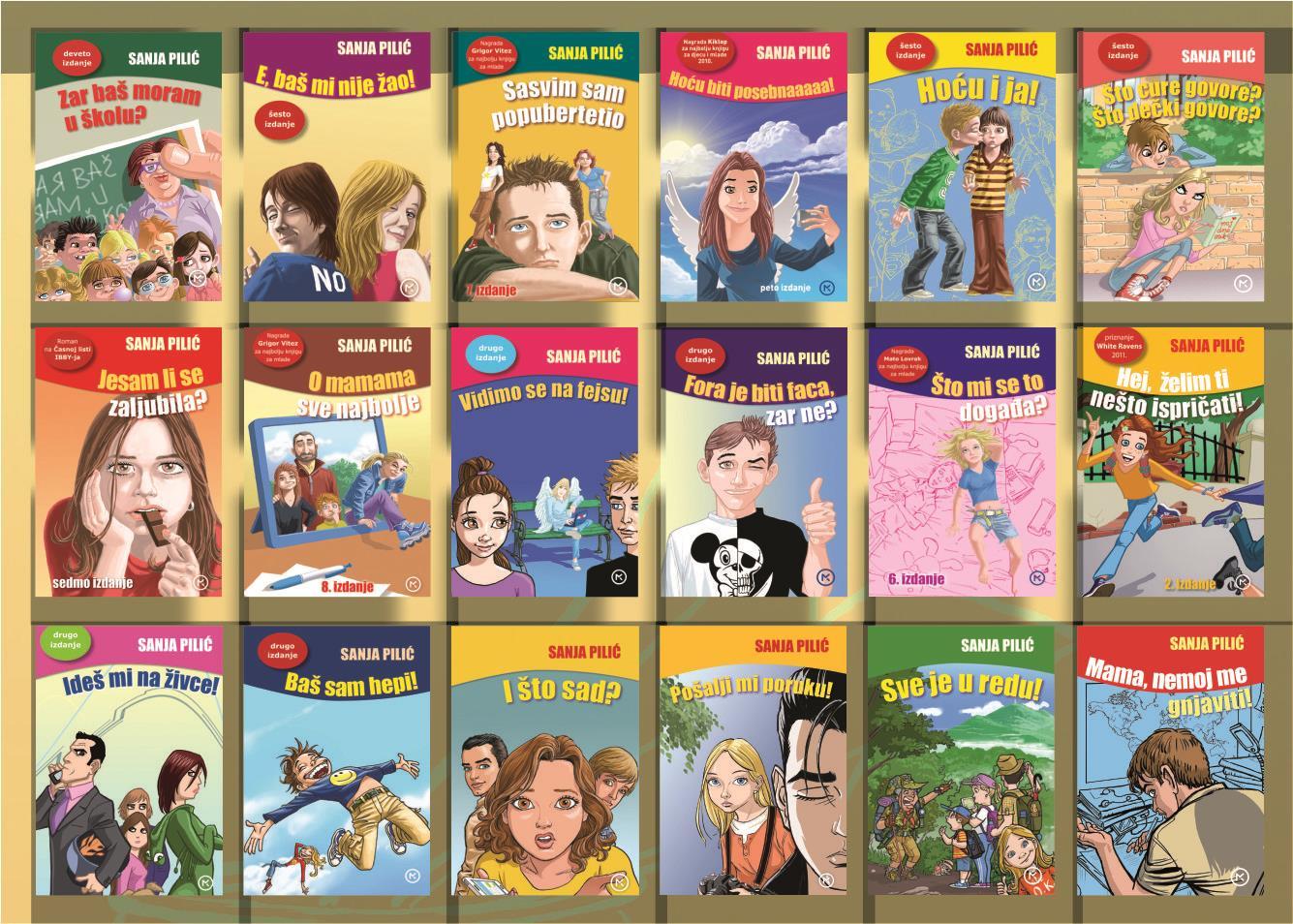
Pilić, Sanja. Maša i učiteljica (Maša and the Teacher). Illus. Niko Barun. Zagreb: Mozaik knjiga.
Pilić, Sanja. Nemam vremena (I Don't Have Time). Illus. Robert Graffius. 6th ed.
Zagreb: Alfa.
Pilić, Sanja. Sve je u redu! (Everything is OK!,). Illus. Niko Barun. Zagreb: Mozaik knjiga.
Sanja Pilić 29
2016.
Pilić, Sanja. Čudesni izvori (The Miraculous Sources). Zagreb: Hrvatski muzej naivne umjetnosti.
Pilić, Sanja. E, baš mi nije žao (And I Don't Care!). Illus. Niko Barun. 8th ed. Zagreb: Mozaik knjiga.
Pilić, Sanja. Hej, želim ti nešto ispričati! (Hey, I Want to Tell You Something!). Illus. Niko Barun. 4th ed. Zagreb: Mozaik knjiga.
Pilić, Sanja. Hoću biti posebnaaaaa! (I Want to be Special!). Illus. Niko Barun. 9th ed. Zagreb: Mozaik knjiga.
Pilić, Sanja. Hoću i ja! (Me, too!). Illus. Niko Barun. 8th ed. Zagreb: Mozaik knjiga.
Pilić, Sanja. Ideš mi na živce! (You're Getting on My Nerves!). Illus. Niko Barun. 3rd ed. Zagreb: Mozaik knjiga.
Pilić, Sanja. Maša i kazalište (Maša and the Theather). Illus. Niko Barun. Zagreb: Mozaik knjiga.
Pilić, Sanja. Maša i ljeto (Maša and Summer). Illus. Niko Barun. Zagreb: Mozaik knjiga.
Pilić, Sanja. Maša i sport (Maša and Sport). Illus. Niko Barun. Zagreb: Mozaik knjiga.
Pilić, Sanja. Mrvice iz dnevnog boravka (Crumbs from the Living Room). Illus. Dario Kukić. 8th ed. Zagreb: Alfa.
Pilić, Sanja. Nemoderni Perica (The Old-Fashioned Pete). Zagreb: Kašmir promet.
Pilić, Sanja. Pošalji mi poruku! (Text Me!). Illus. Niko Barun. Zagreb: Mozaik knjiga.
Pilić, Sanja. Sasvim sam popubertetio (Totally Teen). Illus. Niko Barun. 9th ed. Zagreb: Mozaik knjiga.
Pilić, Sanja. Što cure govore? Što dečki govore? (What Girls Say? What Boys Say?). Illus. Niko Barun. 8th ed. Zagreb: Mozaik knjiga.
Pilić, Sanja. Što mi se to događa? (What’s Happening to Me?).Illus. Niko Barun. 8th ed. Zagreb: Mozaik knjiga.
Sanja Pilić 30
Pilić, Sanja. Vidimo se na fejsu! (See You on Facebook!). Zagreb: Zaklada
Čujem, vjerujem, vidim. 1 CD: MP3
Pilić, Sanja. Zar baš moram u školu? (Do I Really Have to go to School?). Illus. Niko Barun. 9th ed. Zagreb: Mozaik knjiga
2015.
Pilić, Sanja. Baš sam hepi! (I'm So Happy!). Illus. Niko Barun. 2nd ed. Zagreb: Mozaik knjiga.
Pilić, Sanja. Djed Mraz darove nosi (Santa Claus Brings Presents). Illus. Niko Barun. Zagreb: Mozaik knjiga.
Pilić, Sanja. Fora je biti faca, zar ne? (It's Cool to be Someone, isn't it?). Illus. Niko Barun. 5th ed. Zagreb: Mozaik knjiga.
Pilić, Sanja. Hoću biti posebnaaaaa! (I Want to be Special!). Illus. Niko Barun. 7th ed. Zagreb: Mozaik knjiga.
Pilić, Sanja. Hoću biti posebnaaaaa! (I Want to be Special!). Illus. Niko Barun. 8th ed. Zagreb: Mozaik knjiga.
Pilić, Sanja. Hoću i ja! (Me, too!). Illus. Niko Barun. 7th ed. Zagreb: Mozaik knjiga.
Pilić, Sanja. I što sad? (And Now What?). Illus. Niko Barun. Zagreb: Mozaik knjiga.
Pilić, Sanja. Jesam li se zaljubila? (Am I in Love?). Illus. Niko Barun. 9th ed. Zagreb: Mozaik knjiga.
Pilić, Sanja. Maša i bajke (Maša and the Fairy Tales). Illus. Niko Barun. Zagreb: Mozaik knjiga.
Pilić, Sanja. Maša i putovanje (Maša and a Travel). Illus. Niko Barun. Zagreb: Mozaik knjiga.
Pilić, Sanja. O mamama sve najbolje (All the Best About Mums). Illus. Niko Barun. 9th ed. Zagreb: Mozaik knjiga.
Pilić, Sanja. Što cure govore? Što dečki govore? (What Girls Say? What Boys Say?). Illus. Niko Barun. 7th ed. Zagreb: Mozaik knjiga.
Sanja Pilić 31
Pilić, Sanja. Vidimo se na fejsu! (See You on Facebook!). Illus. Niko Barun. 4th ed. Zagreb: Mozaik knjiga.
Pilić, Sanja. Vidimo se na fejsu! (See You on Facebook!). Illus. Niko Barun. 5th ed. Zagreb: Mozaik knjiga.
Pilić, Sanja. Zar baš moram u školu? (Do I Really Have to go to School?). Illus. Niko Barun. 8th ed. Zagreb: Mozaik knjiga.
2014.
Pilić, Sanja. E, baš mi nije žao (And I Don't Care!). Illus. Niko Barun. 7th ed.
Zagreb: Mozaik knjiga.
Pilić, Sanja. Hej, želim ti nešto ispričati! (Hey, I Want to Tell You Something!).
Illus. Niko Barun. 3rd ed. Zagreb: Mozaik knjiga.
Pilić, Sanja. Hoću biti posebnaaaaa! (I Want to be Special!). Illus. Niko Barun. 6th ed. Zagreb: Mozaik knjiga.
Pilić, Sanja. Jesam li se zaljubila? (Am I in Love?). Illus. Niko Barun. 8th ed.
Zagreb: Mozaik knjiga.
Pilić, Sanja. Kiki i ostali (Kiki and Others). Illus. Darko Kreč. Zagreb: Mozaik knjiga.
Pilić, Sanja. Maša i Božić (Maša and Christmas). Illus. Niko Barun. 2nd ed.
Zagreb: Mozaik knjiga.
Pilić, Sanja. Maša i gosti (Maša and Guests). Illus. Niko Barun. 3rd ed. Zagreb: Mozaik knjiga.
Pilić, Sanja. Maša i klaun (Maša and the Clown). Illus. Niko Barun. Zagreb: Mozaik knjiga.
Pilić, Sanja. Maša i muzej (Maša and the Museum). Illus. Niko Barun. Zagreb: Mozaik knjiga.
Pilić, Sanja. Maša i nova učenica (Maša and the New Pupil). Illus. Niko Barun. 2nd ed. Zagreb: Mozaik knjiga.
Pilić, Sanja. Maša i životinje (Maša and the Animals). Illus. Niko Barun. 2nd ed. Zagreb: Mozaik knjiga.
Sanja Pilić 32
Pilić, Sanja. Mrvice iz dnevnog boravka (Crumbs from the Living Room). Illus. Dario Kukić. 7th ed. Zagreb: Alfa.
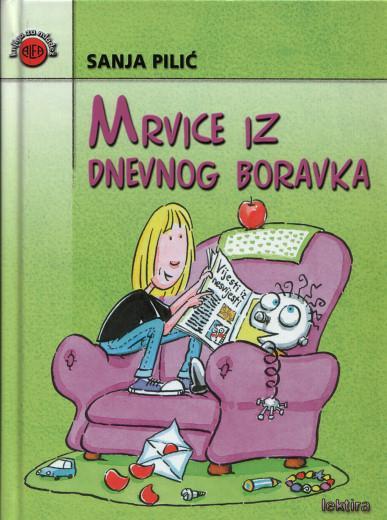
Pilić, Sanja. O mamama sve najbolje (All the Best About Mums). Illus. Niko Barun. 8th ed. Zagreb: Mozaik knjiga.
Pilić, Sanja. Sasvim sam popubertetio (Totally Teen). Illus. Niko Barun. 8th ed. Zagreb: Mozaik knjiga.
Pilić, Sanja. Stigao je brat (My New Brother is Here). Illus. Andrea Petrlik Huseinović. 2nd ed. Zagreb: Kašmir promet.
Pilić, Sanja. Što mi se to događa? (What’s Happening to Me?). Illus. Niko Barun. 7th ed. Zagreb: Mozaik knjiga.
Pilić, Sanja. Vidimo se na fejsu! (See You on Facebook!). Illus. Niko Barun. 3rd ed. Zagreb: Mozaik knjiga.
Pilić, Sanja. Zar baš moram u školu? (Do I Really Have to go to School?). Illus. Niko Barun. 6th ed. Zagreb: Mozaik knjiga.
Plić, Sanja. Nemam vremena (I Don't Have Time). Illus. Robert Graffius. 5th ed. Zagreb: Alfa.

Sanja Pilić 33
2013.
Pilić, Sanja. Baš sam hepi! (I'm So Happy!). Illus. Niko Barun. Zagreb: Mozaik knjiga.
Pilić, Sanja. Fora je biti faca, zar ne? (It's Cool to be Someone, isn't it?). Illus. Niko Barun. 4th ed. Zagreb: Mozaik knjiga.
Pilić, Sanja. Hej, želim ti nešto ispričati! (Hey, I Want to Tell You Something!). Illus. Niko Barun. 2nd ed. Zagreb: Mozaik knjiga.
Pilić, Sanja. Ideš mi na živce! (You're Getting on My Nerves!). Illus. Niko Barun. 2nd ed. Zagreb: Mozaik knjiga.
Pilić, Sanja. Maša i gosti (Maša and Guests). Illus. Katarina Halužan. 2nd ed.
Zagreb: Mozaik knjiga.
Pilić, Sanja. Maša i ljeto (Maša and Summer). Illus. Katarina Halužan. Zagreb: Mozaik knjiga.
Pilić, Sanja. Što cure govore? Što dečki govore? (What Girls Say? What Boys Say?). Illus. Niko Barun. 6th ed. Zagreb: Mozaik knjiga.
Pilić, Sanja. Vidimo se na fejsu! (See You on Facebook!). Illus. Niko Barun. 2nd ed. Zagreb: Mozaik knjiga.
2012.
Pilić, Sanja. E, baš mi nije žao (And I Don’t Care!). Illus. Niko Barun. 6th ed.
Zagreb: Mozaik knjiga.
Pilić, Sanja. Hoću biti posebnaaaaa! (I Want to be Special!). Illus. Niko Barun. 4th ed. Zagreb: Mozaik knjiga.
Pilić, Sanja. Hoću i ja! (Me, too!). Illus. Niko Barun. 6th ed. Zagreb: Mozaik knjiga.
Pilić, Sanja. Jesam li se zaljubila? (Am I in Love?). Illus. Niko Barun. 7th ed.
Zagreb: Mozaik knjiga.
Pilić, Sanja. Maša i Božić (Maša and Christmas). Illus. Katarina Halužan.
Zagreb: Mozaik knjiga.
Sanja Pilić 34
Pilić, Sanja. Maša i životinje (Maša and the Animals). Illus. Katarina Halužan. Zagreb: Mozaik knjiga.
Pilić, Sanja. O mamama sve najbolje (All the Best About Mums). Illus. Niko Barun. 7th ed. Zagreb: Mozaik knjiga.

Pilić, Sanja. Sasvim sam popubertetio (Totally Teen). Illus. Niko Barun. 7th ed. Zagreb: Mozaik knjiga.

Pilić, Sanja. Što cure govore? Što dečki govore? (What Girls Say? What Boys Say?). Illus. Niko Barun. 5th ed. Zagreb: Mozaik knjiga.
Pilić, Sanja. Što cure govore? Što dečki govore? (What Girls Say? What Boys Say?). Illus. Niko Barun. 6th ed. Zagreb: Mozaik knjiga.
Pilić, Sanja. Što mi se to događa? (What’s Happening to Me?). Illus. Niko Barun. 6th ed. Zagreb: Mozaik knjiga.
Pilić, Sanja. Vidimo se na fejsu! (See You on Facebook!). Illus. Niko Barun. Zagreb: Mozaik knjiga.
Pilić, Sanja. Zar baš moram u školu? (Do I Really Have to go to School?). Illus. Niko Barun. 5th ed. Zagreb: Mozaik knjiga.
Sanja Pilić 35
2011.
Pilić, Sanja. Hej, želim ti nešto ispričati! (Hey, I Want to Tell You Something!). Illus. Niko Barun. Zagreb: Mozaik knjiga.
Pilić, Sanja. Hoću i ja! (Me, too!). Illus. Niko Barun. 5th ed. Zagreb: Mozaik knjiga.
Pilić, Sanja. Ideš mi na živce! (You're Getting on My Nerves!). Illus. Niko Barun. Zagreb: Mozaik knjiga.
Pilić, Sanja. Maša i gosti (Maša and Guests). Illus. Katarina Halužan. Zagreb: Mozaik knjiga.
Pilić, Sanja. Maša i nova učenica (Maša and the New Pupil). Illus. Katarina Halužan. Zagreb: Mozaik knjiga.
Pilić, Sanja. Mrvice iz dnevnog boravka (Crumbs from the Living Room). Illus. Dario Kukić. 6th ed. Zagreb: Alfa.
Pilić, Sanja. Sasvim sam popubertetio (Totally Teen). Illus. Niko Barun. 6th ed. Zagreb: Mozaik knjiga.
Pilić, Sanja. Što cure govore? Što dečki govore? (What Girls Say? What Boys Say?). Illus. Niko Barun. 4th ed. Zagreb: Mozaik knjiga.
Pilić, Sanja. Što mi se to događa? (What’s Happening to Me?). Illus. Niko Barun. 5th ed. Zagreb: Mozaik knjiga.
Pilić, Sanja. Vidiš da se moram zabavljati (I Must Have Fun, don't You See?) Ilus. Andrea Petrlik-Huseinović. 2nd ed. Zagreb: Kašmir promet.
Pilić, Sanja. Zaljubljeni medo (A Bear in Love). Illus. Andrea Petrlik Huseinović. 2nd ed. Zagreb: Kašmir promet.
Pilić, Sanja. Zar baš moram u školu? (Do I Really Have to go to School?). Illus. Niko Barun. 4th ed. Zagreb: Mozaik knjiga.
Pilić, Sanja. Znatiželjna koka (A Curious Chicken). Illus. Andrea Petrlik Huseinović. 3rd ed. Zagreb: Kašmir promet.
Sanja Pilić 36
2010.
Pilić, Sanja. E, baš mi nije žao (And I Don’t Care!). Illus. Niko Barun. 5th ed.
Zagreb: Mozaik knjiga.
Pilić, Sanja. Fora je biti faca, zar ne? (It's Cool to be Someone, isn't it?). Illus. Niko Barun. 2nd ed. Zagreb: Mozaik knjiga.
Pilić, Sanja. Hoću biti posebnaaaaa! (I Want to be Special!). Illus. Niko Barun.
Zagreb: Mozaik knjiga.
Pilić, Sanja. Hoću biti posebnaaaaa! (I Want to be Special!). Illus. Niko Barun. 2nd ed. Zagreb: Mozaik knjiga.
Pilić, Sanja. Hoću biti posebnaaaaa! (I Want to be Special!). Illus. Niko Barun. 3rd ed. Zagreb: Mozaik knjiga.
Pilić, Sanja. Jesam li se zaljubila? (Am I in Love?)
?). Illus. Niko Barun. 6th ed. Zagreb: Mozaik knjiga.
Pilić, Sanja. Nemam vremena (I Don't Have Time). Illus. Robert Graffius. 4th ed.
Zagreb: Alfa.
Pilić, Sanja. O mamama sve najbolje (All the Best About Mums). Illus. Niko Barun. 6th ed. Zagreb: Mozaik knjiga.
Pilić, Sanja. Priča o vučiću Grgi (A Story about Grga the Little Wolf). Illus.

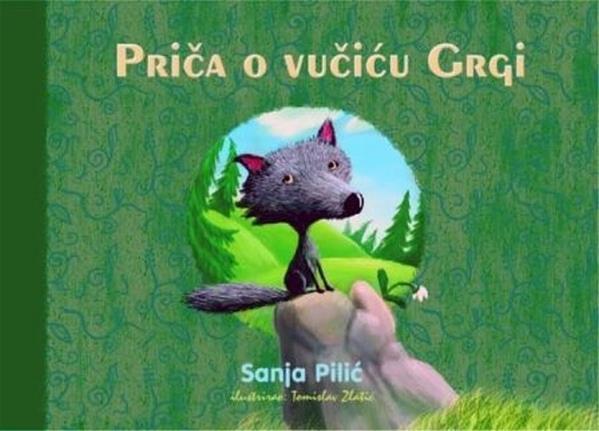
Tomislav Zlatić. 2nd ed. Zagreb: Državni zavod za zaštitu prirode.
Pilić, Sanja. Sasvim sam popubertetio (Totally Teen). Illus. Niko Barun. 5th ed.
Zagreb: Mozaik knjiga.
Sanja Pilić 37
Pilić, Sanja. Vuk Grga i njegova obitelj (Grga the Little Wolf and His Family). Illus. Tomislav Zlatić. 2nd ed. Zagreb: Državni zavod za zaštitu prirode.
Pilić, Sanja. Zar baš moram u školu? (Do I Really Have to go to School?). Illus. Niko Barun. 3rd ed. Zagreb: Mozaik knjiga.
2009.
Pilić, Sanja. E, baš mi nije žao (And I Don’t Care!). Illus. Niko Barun. 4th ed.
Zagreb: Mozaik knjiga.
Pilić, Sanja. Fora je biti faca, zar ne? (It's Cool to be Someone, isn't it?). Illus. Niko Barun. Zagreb: Mozaik knjiga.
Pilić, Sanja. Hoću i ja! (Me, too!). Illus. Niko Barun. 4th ed. Zagreb: Mozaik knjiga.
Pilić, Sanja. Jesam li se zaljubila? (Am I in Love?). Illus. Niko Barun. 5th ed. Zagreb: Mozaik knjiga.
Pilić, Sanja. Mrvice iz dnevnog boravka (Crumbs from the Living Room). Illus. Dario Kukić. 5th ed. Zagreb: Alfa.
Pilić, Sanja. O mamama sve najbolje (All the Best About Mums). Illus. Niko Barun. 5th ed. Zagreb: Mozaik knjiga.
Pilić, Sanja. Sasvim sam popubertetio (Totally Teen). Illus. Niko Barun. 4th ed. Zagreb: Mozaik knjiga.
Pilić, Sanja. Što cure govore? Što dečki govore? (What Girls Say? What Boys Say?). Illus. Niko Barun. 2nd ed. Zagreb: Mozaik knjiga.
Pilić, Sanja. Što cure govore? Što dečki govore? (What Girls Say? What Boys Say?). Illus. Niko Barun. 3rd ed. Zagreb: Mozaik knjiga.
Pilić, Sanja. Što mi se to događa? (What’s Happening to Me?). Illus. Niko Barun. 3rd ed. Zagreb: Mozaik knjiga.
Pilić, Sanja. Što mi se to događa? (What’s Happening to Me?). Illus. Niko Barun. 4th ed. Zagreb: Mozaik knjiga.
Pilić, Sanja. Tople priče za hladne dane 1. Zagreb: Arpeggio. 1 CD (Audio book)
Sanja Pilić 38
Pilić, Sanja. Vuk Grga i njegova obitelj (Grga the Little Wolf and His Family). Illus. Tomislav Zlatić. Zagreb: Državni zavod za zaštitu prirode.
Pilić, Sanja. Zar baš moram u školu? (Do I Really Have to go to School?). Illus. Niko Barun. 2nd ed. Zagreb: Mozaik knjiga.
2008.
Pilić, Sanja. Hoću i ja! (Me, too!). Illus. Niko Barun. 3rd ed. Zagreb: Mozaik knjiga.
Pilić, Sanja. Jesam li se zaljubila? (Am I in Love?). Illus. Niko Barun. 4th ed. Zagreb: Mozaik knjiga.
Pilić, Sanja. Sasvim sam popubertetio (Totally Teen). Illus. Niko Barun. 3rd ed. Zagreb: Mozaik knjiga.
Pilić, Sanja. Što cure govore? Što dečki govore? (What Girls Say? What Boys Say?). Illus. Niko Barun. Zagreb: Mozaik knjiga.
Pilić, Sanja. Što mi se to događa? (What’s Happening to Me?). Illus. Niko Barun. 2nd ed. Zagreb: Mozaik knjiga.
Pilić, Sanja. Zar baš moram u školu? (Do I Really Have to go to School?). Illus. Niko Barun. Zagreb: Mozaik knjiga.
2007.
Pilić, Sanja. E, baš mi nije žao (And I Don’t Care!). Illus. Niko Barun. 3rd ed. Zagreb: Mozaik knjiga.
Pilić, Sanja. Hoću i ja! (Me, too!). Illus. Niko Barun. 2nd ed. Zagreb: Mozaik knjiga.
Pilić, Sanja. Jesam li se zaljubila? (Am I in Love?). Illus. Niko Barun. 3rd ed.
Zagreb: Mozaik knjiga.
Pilić, Sanja. Mrvice iz dnevnog boravka (Crumbs from the Living Room). Illus. Dario Kukić. 4th ed. Zagreb: Alfa.
Pilić, Sanja. Nemam vremena (I Don't Have Time). Illus. Robert Graffius. 3rd ed.
Zagreb: Alfa.
Sanja Pilić 39
Pilić, Sanja. O mamama sve najbolje (All the Best About Mums). Illus. Tomislav Tomić. 3rd ed. Zagreb: Mozaik knjiga.
Pilić, Sanja. Sasvim sam popubertetio (Totally Teen). Illus. Niko Barun. 2nd ed. Zagreb: Mozaik knjiga.
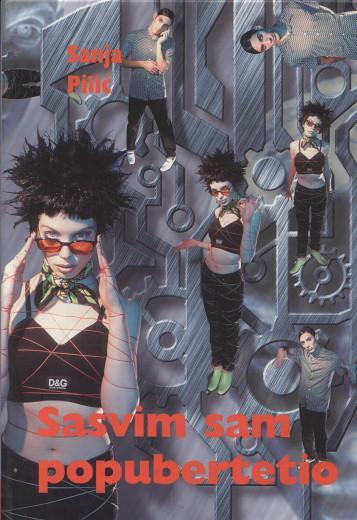

Pilić, Sanja. Što mi se to događa? (What’s Happening to Me?). Illus. Niko Barun. Zagreb: Mozaik knjiga.
2006.
Pilić, Sanja. Jesam li se zaljubila? (Am I in Love?). Illus. Niko Barun. 2nd ed.
Zagreb: Mozaik knjiga.
Pilić, Sanja. Jesam li se zaljubila? (Am I in Love?). Illus. Niko Barun. Zagreb: Mozaik knjiga.
Pilić, Sanja. Mrvice iz dnevnog boravka (Crumbs from the Living Room). Illus. Dario Kukić. 3rd ed. Zagreb: Alfa.
Sanja Pilić 40
Pilić, Sanja. My New Brother is Here. Illus. Andrea Petrlik Huseinović. Zagreb: Kašmir promet.
Pilić, Sanja. Nemam vremena (I Don't Have Time). Illus. Robert Graffius. 2nd ed. Zagreb: Alfa.
Pilić, Sanja. Stigao je brat (My New brother is Here). Illus. Andrea Petrlik Huseinović. Zagreb: Kašmir promet.
2005.
Pilić, Sanja. Djed Mraz darove nosi (Santa Claus Brings Presents). Illus. Niko Barun. Zagreb: Mozaik knjiga.
Pilić, Sanja. E, baš mi nije žao (And I Don’t Care!). Illus. Tomislav Tomić. Zagreb: Mozaik knjiga.
Pilić, Sanja. Mrvice iz dnevnog boravka (Crumbs from the Living Room). Illus. Dario Kukić. 2nd ed. Zagreb: Alfa.
Pilić, Sanja. O mamama sve najbolje (All the Best About Mums). Illus. Tomislav Tomić. Zagreb: Mozaik knjiga.
Pilić, Sanja. Priča o vučiću Grgi (A Story about Grga the Little Wolf). Illus. Tomislav Zlatić. Zagreb: Državni zavod za zaštitu prirode.
2004.
Pilić, Sanja. Princeza (The Princess). Illus. Marijana Jelić. Zagreb: Školska knjiga.
Pilić, Sanja. Hoću i ja! (Me, too!). Illus. Darko Kreč. Zagreb: Mozaik knjiga.
2003.
Nipetnišest (In a Heartbeat) / Višnja Biti, Sanja Pilić. Zagreb: Školska knjiga [etc.].
Pilić, Sanja. Jupi, došao je sveti Nikola (Hurray! St. Nicholas Has Arrived). Illus. Katarina Halužan. Zagreb: Školska knjiga.
Sanja Pilić 41
Pilić, Sanja. Mrvice iz dnevnog boravka (Crumbs from the Living Room). Illus. Dario Kukić. Zagreb: Alfa.
Pilić, Sanja. Nemam vremena (I Don't Have Time). Illus. Robert Graffius. Zagreb: Alfa.
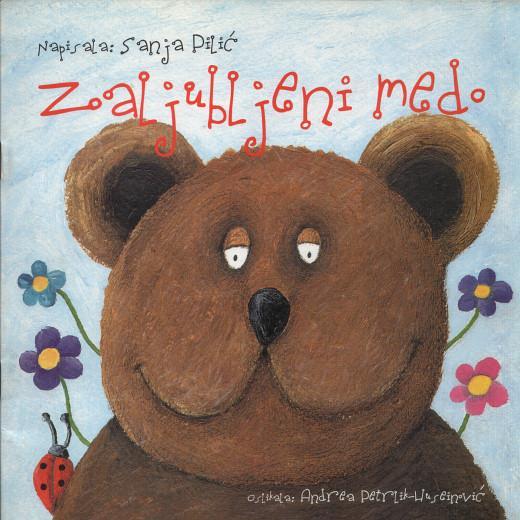
Pilić, Sanja. Zafrkancije, zezancije, smijancije i ludancije (Jokes, Gags, Laughs and Banter). Illus. Zlatan Vrkljan. 2nd ed. Zagreb: Školska knjiga.
Različitosti, od vrijeđanja do umorstva (Diversity, from Insult to Murder) / Marie Agnes Combesque, Sanja Pilić. Zagreb: Naklada Ljevak.
2002.
Pilić, Sanja. Čudesni lončić (A magical little pot). Illus. Manuela VladićMaštruko. Zagreb: Naklada Haid.
Pilić, Sanja. Sasvim sam popubertetio (Totally Teen). Zagreb: Kašmir promet.
Pilić, Sanja. Znatiželjna koka (A Curious Chicken). Illus. Andrea Petrlik Huseinović. 2nd ed. Zagreb: Kašmir promet.

2001.
Pilić, Sanja. Zafrkancije, zezancije, smijancije i ludancije (Jokes, Gags, Laughs and Banter). Illus. Zlatan Vrkljan. Zagreb: Školska knjiga.
Sanja Pilić 42
2000.
Pilić, Sanja. Zaljubljeni medo (A Bear in Love). Illus. Andrea Petrlik Huseinović. Zagreb: Kašmir promet.
Pilić, Sanja. Znatiželjna koka (A Curious Chicken). Illus. Andrea Petrlik Huseinović. Zagreb: Kašmir promet.
1999.
Pilić, Sanja. Vidiš da se moram zabavljati (I Must Have Fun, don't You See?).
Illus. Andrea Petrlik Huseinović. Zagreb: Kašmir promet.

1998.
Pilić, Sanja. Bobi, pas čuvar (Bobby, the Guard Dog). Illus. by John Francis. Zagreb: Naša djeca.
Pilić, Sanja. E, baš mi nije žao (And I Don’t Care!). Illus. Pika Vončina. Zagreb: Mozaik knjiga.

Sanja Pilić 43
Pilić, Sanja. Flopi u zoološkom vrtu (Floppy in the Zoo). Illus. John Francis.
Zagreb: Naša djeca.
Pilić, Sanja. Odveži, zaveži i igraj se (Untie, Tie and Play). Zagreb: Naša djeca.
Pilić, Sanja. Tko stanuje u šumi? (Who Lives in the Forest?). Illus. John Francis.
Zagreb: Naša djeca.
Pilić, Sanja. Učimo vezati, igrajući se (We Learn to Tie, Playing). Illus. Maria Mantovani. Zagreb: Naša djeca.
Pilić, Sanja. Zimske radosti (Winter Joys). Illus. John Francis. Zagreb: Naša djeca.
1997.
Pilić, Sanja. Hajdemo se igrati (Let's Play). Illus. Jirina Lockerova. Zagreb: Naša djeca.
Pilić, Sanja. I mi ćemo biti veliki (We Will be Big too). Illus. Jirina Lockerova.
Zagreb: Naša djeca.
Pilić, Sanja. Uživajmo u proljeću (Let's Enjoy Spring). Illus. Jirina Lockerova.
Zagreb: Naša djeca.
1996.
Pilić, Sanja. Mačkica Slatkica (Sweetie Kitty). Illus. Debbie Richardson. Zagreb: Naša djeca.
Pilić, Sanja. Nespretni pačić (A Clumsy Duckling). Illus. Debbie Richardson.
Zagreb: Naša djeca.
Pilić, Sanja. Plašljivi zečić (Fearfull Bunny). Illus. Debbie Richardson. Zagreb: Naša djeca.
Pilić, Sanja. Pospanko Tobi (Sleepy Tobi). Illus. Debbie Richardson. Zagreb: Naša djeca.
Sanja Pilić 44
1995.
Pilić, Sanja. Mrvice iz dnevnog boravka (Crumbs from the Living Room). Illus. Ninoslav Kunc. Zagreb: Znanje.

1994.
Pilić, Sanja. Nemam vremena (I Don't Have Time). Illus. Ninoslav Kunc. Zagreb: Mladost.
1992.
Pilić, Sanja. O mamama sve najbolje (All the Best About Mums). Illus. Ninoslav Kunc. 2nd ed. Zagreb: Mladost.
1990.
Pilić, Sanja. O mamama sve najbolje (All the Best About Mums). Illus. Ninoslav Kunc. Zagreb: Mladost.
Sanja Pilić 45
7. List of translated editions
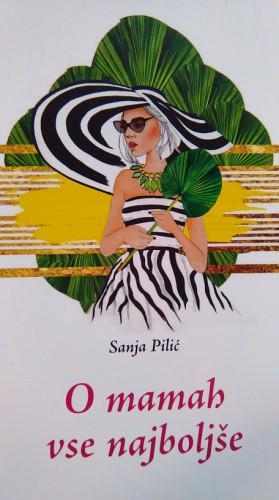
Hej, želim ti nešto ispričati! (Hey, I Want to Tell You Something!)
Translation to Albanian: Hej, dëshiroj të të tregoj diçka! Pristina: Magjia e librit, 2019.
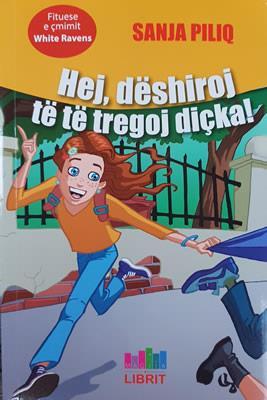
O mamama sve najbolje (All the Best About Mums)
Translation to Slovenian: O mamah vse najboljše. Ljubljana: Forma7, 2016.
Jesam li se zaljubila? (Am I in Love?)
Translation to Slovenian: Sem se zaljubila? Lubljana: Mladinska knjiga, 2009.
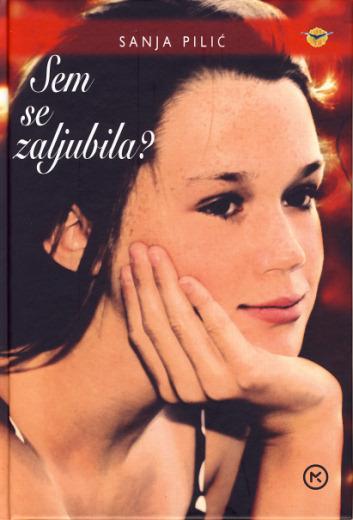
Stigao je brat (My New Brother Is Here)
Translation to English: My New Brother is Here. Zagreb: Kašmir promet, 2006.
Translation to Slovenian: Dobil sem bratca. Ljubljana: Založba Karantanija, 2006.
Sanja Pilić 46
8. Ten of the most important titles
1. Hej, želim ti nešto ispričati (Hey, I Want to Tell You Something!)
(2011)Illus. Niko Barun. Zagreb: Mozaik knjiga.
(2013) Illus. Niko Barun. 2nd ed. Zagreb: Mozaik knjiga.
(2014) Illus. Niko Barun. 3rd ed. Zagreb: Mozaik knjiga.
(2016) Illus. Niko Barun. 4th ed. Zagreb: Mozaik knjiga.
(2021) Illus. Niko Barun. 5th ed. Zagreb: Mozaik knjiga.
2. Ideš mi na živce! (You're Getting on My Nerves!)
(2011) Illus. Niko Barun. Zagreb: Mozaik knjiga. 2011.
(2013) Illus. Niko Barun. 2nd ed. Zagreb: Mozaik knjiga. 2013.
(2016) Illus. Niko Barun. 3rd ed. Zagreb: Mozaik knjiga.2016.
(2019) Illus. Niko Barun. 4th ed. Zagreb: Mozaik knjiga.2019.
3. Jesam li se zaljubila? (Am I in Love?)
(2006) Illus. Niko Barun. Zagreb: Mozaik knjiga.2006.
(2006) Illus. Niko Barun. 2nd ed. Zagreb: Mozaik knjiga.2006.
(2007) Illus. Niko Barun. 3rd ed. Zagreb: Mozaik knjiga.2007
(2008) Illus. Niko Barun. 4th ed. Zagreb: Mozaik knjiga.2008.
(2009) Illus. Niko Barun. 5th ed. Zagreb: Mozaik knjiga.2009.
(2010) Illus. Niko Barun. 6th ed. Zagreb: Mozaik knjiga.2010.
(2012) Illus. Niko Barun. 7th ed. Zagreb: Mozaik knjiga.2012.
(2014) Illus. Niko Barun. 8th ed. Zagreb: Mozaik knjiga.2014.
(2015) Illus. Niko Barun. 9th ed. Zagreb: Mozaik knjiga.2015.
(2017) Illus. Niko Barun. 10th ed. Zagreb: Mozaik knjiga.2017.
(2021) Illus. Niko Barun. 11th ed. Zagreb: Mozaik knjiga.2021.
4. Mrvice iz dnevnog boravka (Crumbs from the Living Room)
(1995) Illus. Ninoslav Kunc. Zagreb: Znanje.
(2003) Illus. Dario Kukić. Zagreb: Alfa.
(2005) Illus. Dario Kukić. 2nd ed. Zagreb: Alfa.
Sanja Pilić 47
(2006) Illus. Dario Kukić. 3rd ed. Zagreb: Alfa.
(2007) Illus. Dario Kukić. 4th ed. Zagreb: Alfa.
(2009) Illus. Dario Kukić. 5th ed. Zagreb: Alfa.
(2011) Illus. Dario Kukić. 6th ed. Zagreb: Alfa.
(2014) Illus. Dario Kukić. 7th ed. Zagreb: Alfa.
(2016) Illus. Dario Kukić. 8th ed. Zagreb: Alfa.
(2018) Illus. Dario Kukić. 9th ed. Zagreb: Alfa.
(2021) Illus. Dario Kukić. 10th ed. Zagreb: Alfa.
(1994) Illus. Ninoslav Kunc. Zagreb: Mladost.
(2003) Illus. Robert Graffius. Zagreb: Alfa.
(2006) Illus. Robert Graffius. 2nd ed. Zagreb: Alfa.
(2007) Illus. Robert Graffius. 3rd ed. Zagreb: Alfa.
(2010) Illus. Robert Graffius. 4th ed. Zagreb: Alfa.
(2014) Illus. Robert Graffius. 5th ed. Zagreb: Alfa.
(2017) Illus. Robert Graffius. 6th ed. Zagreb: Alfa.
(2021) Illus. Robert Graffius. 7th ed. Zagreb: Alfa.
(1990) Illus. Ninoslav Kunc. Zagreb: Mladost.
(1992) Illus. Ninoslav Kunc. 2nd ed. Zagreb: Mladost.
(2005) Illus. Tomislav Tomić. 3rd ed. Zagreb: Mozaik knjiga.
(2007) Illus. Tomislav Tomić. 4th ed. Zagreb: Mozaik knjiga.
(2009) Illus. Niko Barun. 5th ed. Zagreb: Mozaik knjiga.
(2010) Illus. Niko Barun. 6th ed. Zagreb: Mozaik knjiga.
(2012) Illus. Niko Barun. 7th ed. Zagreb: Mozaik knjiga.
(2014) Illus. Niko Barun. 8th ed. Zagreb: Mozaik knjiga.
(2015) Illus. Niko Barun. 9th ed. Zagreb: Mozaik knjiga.
(2018) Illus. Niko Barun. 10th ed. Zagreb: Mozaik knjiga.
(2022) Illus. Niko Barun. 11th ed. Zagreb: Mozaik knjiga.
7. Pošalji mi poruku! (Text Me!)
(2016) Illus. Niko Barun. Zagreb: Mozaik knjiga.
(2022) Illus. Niko Barun. 2nd ed. Zagreb: Mozaik knjiga.
Sanja Pilić 48
5. Nemam vremena (I Don't Have Time)
6. O mamama sve najbolje (All the Best About Mums)
8. Sasvim sam popubertetio (Totally Teen)
(2002). Zagreb: Kašmir promet, 2002.
(2007) Illus. Niko Barun. 2nd ed. Zagreb: Mozaik knjiga.
(2008) Illus. Niko Barun. 3rd ed. Zagreb: Mozaik knjiga.
(2009) Illus. Niko Barun. 4th ed. Zagreb: Mozaik knjiga.
(2010) Illus. Niko Barun. 5th ed. Zagreb: Mozaik knjiga.
(2011) Illus. Niko Barun. 6th ed. Zagreb: Mozaik knjiga.
(2012) Illus. Niko Barun. 7th ed. Zagreb: Mozaik knjiga.
(2014) Illus. Niko Barun. 8th ed. Zagreb: Mozaik knjiga.
(2016) Illus. Niko Barun. 9th ed. Zagreb: Mozaik knjiga.
(2018) Illus. Niko Barun. 10th ed. Zagreb: Mozaik knjiga.
(2019) Illus. Niko Barun. 11th ed. Zagreb: Mozaik knjiga.
9. Što mi se to događa? (What's Happening to Me?)
(2007) Illus. Niko Barun. Zagreb: Mozaik knjiga.
(2008) Illus. Niko Barun. 2nd ed. Zagreb: Mozaik knjiga.
(2009) Illus. Niko Barun. 3rd ed. Zagreb: Mozaik knjiga.
(2009) Illus. Niko Barun. 4th ed. Zagreb: Mozaik knjiga.
(2011) Illus. Niko Barun. 5th ed. Zagreb: Mozaik knjiga.
(2012) Illus. Niko Barun. 6th ed. Zagreb: Mozaik knjiga.
(2014) Illus. Niko Barun. 7th ed. Zagreb: Mozaik knjiga.
(2016) Illus. Niko Barun. 8th ed. Zagreb: Mozaik knjiga.
(2018) Illus. Niko Barun. 9th ed. Zagreb: Mozaik knjiga.
(2021) Illus. Niko Barun. 10th ed. Zagreb: Mozaik knjiga.
(2001) Illus. Zlatan Vrkljan. Zagreb: Školska knjiga.
(2003) Illus. Zlatan Vrkljan. 2nd ed. Zagreb: Školska knjiga.
(2020) Illus. Branka Hollingsworth Nara. 3rd ed. Zagreb: Školska knjiga.
Sanja Pilić 49
10. Zafrkancije, zezancije, smijancije i ludancije (Jokes, Gags, Laughs and Banter)
9. Five books sent to the Jury
1. Hej, želim ti nešto ispričati! (Hey, I Want to Tell You Something!)
(2021) Illus. Niko Barun. 5th ed. Zagreb: Mozaik knjiga.
2. Jesam li se zaljubila? (Am I in Love?)
(2021) Illus. Niko Barun. 11th ed. Zagreb: Mozaik knjiga.2021.
3. O mamama sve najbolje (All the Best About Mums)
(2022) Illus. Niko Barun. 11th ed. Zagreb: Mozaik knjiga.
4. Pošalji mi poruku! (Text Me!)
(2022) Illus. Niko Barun. 2nd ed. Zagreb: Mozaik knjiga.
5. Sasvim sam popubertetio (Totally Teen)
(2018) Illus. Niko Barun. 10th ed. Zagreb: Mozaik knjiga.
Sanja Pilić 50
10. Reviews of the books submitted to the Jury
1. Hej, želim ti nešto
ispričati!
(Hey, I Want to Tell You Something!)
School – Everyday life – Siblings –Parents
Croatian children’s literature would be poorer without Sanja Pilić’s many works and good stories. More than twenty-five books for children and teenagers as well as numerous awards are among her achievements. In 2011, she once more received the Kiklop award in the picture book category and her children’s book
The White Ravens 2012: A Selection of International Children’s And Youth Literature, p. 54
“Hej, želim ti nešto ispričati!” (Hey, I Want to Tell You Something!) was also nominated. This volume is a collection of pithy two-page short stories, which disclose partly amusing, partly touching events from children’s everyday lives: school, annoying parents, even more annoying siblings, or a secret first love. Short, succinct phrases and catchy staccato-dialogues aptly mirror children’s sometimes droll and distorted perception of the world, which makes reading them and particularly reading them aloud such great fun. (Age: 8+)

Sanja Pilić 51
2.Jesam li se zaljubila? (Am I in Love?)
old girl who is an excellent student and performs all her tasks on time, not allowing anything to prevent her from doing so. One could say she’s a real “nerd”. It should be added that Zlatka laughs at those who are in love and thinks that this cannot happen to her. But, of course, as there are no girls who have never fallen in love, Zlatka was also suddenly intercepted by it.2 The novel deals with the issue of first love, teenage infatuation, the first kiss, and friendship.
Gazibara, S. Likovi dječaka i djevojčica u djelima Sanje Pilić. Život i škola. 21(1/2009), 57, 8-10
Sanja Pilić's novel Am I in Love?

(2006) is the winner of the 2008 IBBY
Honour List.1 The novel’s main character is Zlatka, a thirteen-year-
1 http://hr.wikipedia.org/wiki/Sanja_Pili%c4%87
Zlatka is in Year 7 and talks about her problems and feelings, her friendship with Štefica and Zdenka, and Zorko, Tomo, and Mario, the boys she likes. She doesn’t understand boys and is very confused about them: “From what planet do young men fall into our lives? What do they teach them? How do they raise them to turn out
2 http://knjizara.ekupnja.com/Jesam-li-se-zaljubilaSanja-Pilic-pr-18411.html
like such irresistible mugs?”3 Zlatka experiences her first date with her boyfriend, her first kiss, and describes how she feels and how insecure and confused she is. Like all girls in puberty, Zlatka devotes much time to herself and her appearance, constantly grooming herself. She is not satisfied with her appearance; unfortunately, this is a typical case in teenagers. “Regardless, I was able to think about my appearance. While Štefica was gossiping about Ljiljica, I would look a little at the store windows and was not satisfied with what I saw.”4 Girls who were confident before puberty, like Zlatka, may begin to doubt their abilities and question themselves once in puberty. The images of beautiful women they see daily in the media show them what an attractive woman should look like and impose
attractiveness as a priority. Therefore, insecure girls can hardly be satisfied with their bodies. They prioritise teenage magazines and women’s magazines that tell them how to put on make-up and how to dress, and many girls read them. They are exposed to many pressures and may have difficulty developing their own identity, particularly if they do not correspond to the current ideal of beauty.5 That is why they need parental help and friends who understand them and go through the same thing. Of course, by this, we do not mean only the appearance problem but everything that bothers them, preoccupies them, and scares them in this transitional period. Zlatka's friends are Štefica and Zdenka. Zlatka tells them about their problems, and they help each other.
Preuschoff states that belonging to a
Sanja Pilić 53
3 Pilić, S. (2006). Am I in Love? Zagreb: Mozaik knjiga d. o. o.: 103.
4 Pilić, S. (2006). Am I in Love? Zagreb: Mozaik knjiga d. o. o.: 58.
5 According to: Preuschoff, G. (2006). Odgoj djevojčica: Zašto su djevojčice različite i kako im pomoći da budu sretne i jake kad odrastu. Zagreb: Naklada Kosinj
group of girls who are approximately the same age is crucial during puberty. In such groups, a sense of unity is created. In their group, developing girls can safely experiment with hair, clothes, and make-up. Long phone calls and numerous hours together help them build their identity and practice social skills. Solid friendships are expected at this stage and have many benefits; they teach girls to cope with their weaknesses, to say no, to become compassionate interlocutors, and allow them to feel recognition and respect from their environment.6
As is the case with most teenagers, Zlatka’s thoughts constantly wander, other people’s moods greatly influence her, and her moods constantly shift as well. She also thinks about her education, goes
to a music school, and practices
taekwondo. She also thinks about the future and what she will do: “I think about the future. Do I want to play the piano? Should I read Pirates of Senj, the book that was assigned at school that I don’t really find interesting? Is it always good to tell the truth?”7
We find confirmation about the volatility of teenage love in the novel in Zlatka’s words: “Mrs Bunić praised me and said that I was talented, and I looked at Mario and winked. While I was acting cool, I was thinking about Tomo. Then I turned to look at Zorko.”8
Zlatka loves to go to school; thanks to it, she feels that she exists and that she matters. Like Luka, the main character of Sanja’s novel Totally Teen, Zlatka also wants to be the beloved centre of attention and
6 According to: Preuschoff, G. (2006). Odgoj djevojčica: Zašto su djevojčice različite i kako im pomoći da budu sretne i jake kad odrastu. Zagreb: Naklada Kosinj
Sanja Pilić 54
7 Pilić, S. (2006). Am I in Love? Zagreb: Mozaik knjiga d. o. o.: 79.
8 Pilić, S. (2006). Am I in Love? Zagreb: Mozaik knjiga d. o. o.: 89.
hear about her virtues: “Actually, I wanted to talk about me. About how fun and special I am, and even though we spend so much time in the same class, he’s still not bored with me. And he can’t be, because I’m so extraordinary.”9 She believes that growing up is not so fun because of love dilemmas, crushes, acting, etc. At the end of the novel, Zlatka
truly falls in love with Mario, the boy she was dating, and concludes that life is extraordinary: “I don’t know how many times that night I thought that life is strange, especially when you are thirteen years old and you are still a little girl turning into a young woman. Strange, very, very strange.”10
Sanja Pilić 55
9 Pilić, S. (2006). Am I in Love? Zagreb: Mozaik knjiga d. o. o.: 98.
10 Pilić, S. (2006). Am I in Love? Zagreb: Mozaik knjiga d. o. o.: 137.
3.O mamama sve najbolje (All the Best About Mums)

Hranjec, S. (1998). Hrvatski dječji roman. Zagreb: Znanje, 297-299
We could expect such a reaction from a young reader while reading Sanja Pilić's novel All the Best About Mums (1990). Of course, we have not included it in the ludic children's novels category because of this
expected reaction but rather because of all the specific features the author has used to construct this work. We are intentionally calling it a work, as it would be doubtful to call it a novel in the sense in which a children's novel exists: there is no plot, no consistent, "solid" story, there are no traditionally formed characters, no omniscient narrator, moreover, the narrator helplessly surrenders over a typewriter, encouraging the characters: Go on, heroes, wake up. Hardships make heroes. All the heroes humbly stood. The work begins with an initial introductory sequence: the author, a mum, wishes to write a book about herself, as mothers are rarely written about, although she has no idea how the text will turn out. In her work, her name is Caramela Rudinsky; she is 35, is married to a film director named Valdemar, and has two children named Naranča and Lastan. She is a cook and a housewife. She
"Oh, stop messing about!"
wishes to use writing to escape her everyday life:
But the real I in her was throwing itself around, making her restless. The more she sat around the house, the more her I travelled. It discovered a country called Imagination. And in this country, "imagination land", Caramela wishes to realise various forms of existence: at one time, she is Dragica Dukić, then a collected, methodical, solid, and sharp-witted Željka Koprivnjak, then an adolescent on roller skates, who is neither here nor there (in her childhood), and in her imagination she also creates the character of Velimir, who is transposed to reality and even weds Caramela's friend Marijana. From this, she attempts to write a novel. She has no other inspiration, and the work is created by describing her creative inability. At the end of the work, Zlatko Hotko, an editor of the "Plava Biblioteka" publishing house, enters the pub
belonging to her friend and cousin, skims through the novel's manuscript, and decides to publish it. However, it appears that the key to the possible exploration of this work lies in the relationship between the author and the novel, which becomes a personified character. If the characters in Caramela's immediate surroundings, including herself – with all her fears, moods, and depression – are the usual elements of novel fiction, the building elements of a possible novel – the novel-as-a-character in the book is a clever invention. The novel writes the mum, the mum writes the novel, and it is exposed to various dangers to its survival, so it employs telepathy to be completed! This codependence, this inter-writing, certainly belongs to the most original parts:
Let them invent, let them speak whatever they want… The most important thing is that Caramela completes me. (…) The most
Sanja Pilić 57
important thing is that I am progressing… I don't care how…
The most important thing is that it moves. I have the opportunity to become avant-garde or fly into a dumpster straight through the window… But there is a chance… That's important… To have a choice in life… Since I have already managed to make this lazy Caramela to write me, I suppose that managing to work around an editor would be no different… You already know that frogs turn into princes… Therefore, there is hope for me, the novel thought.
oneself to write, isn't that called self-torture? (…) The author could honestly tell their novel: I've given you the best years of my life. My free time. What more could you possibly want from me?
On the opposite side, the author complains to the reader:
On the other hand, what do novels know about human joy? They would take everything from their authors if they could. As if they don't know that life is hard, to put it mildly. And that writing is an arduous business, however strange it may appear. To force
At the very least, we must credit Pilić for her honesty. At one point, Caramela mentions that she would like to write a convoluted, sloppy, blotchy, mucky, and kooky book, an "unhinged" one, as it were. As mentioned earlier, the entire work is an experiment – on the plot level, the introduction of the characters, the somewhat casual, unrestricted expression filled with genre geminations, interior monologues, typographically emphasised syntagms, proverbs… Hence, we have reason to ask ourselves whether children, including young adults, would even understand the work, i.e., which element, which level of it would attract them?
Hrvojka Mihanović-Salopek rightfully determined that the element of
Sanja Pilić 58
attraction can only be "the feeling of closeness and the possibility of identifying the child with the childlike"11. Indeed, we can encounter such thoughts at several points in the work:
People always grow up only partially, no matter how serious they look; How children can be
grown up! And how grown-ups can be children!
This refusal to grow up and the relatable, honest, somewhat satirical portrayal of adult life are possible postulates for the extraordinary reception of this "novel" by Sanja Pilić.
Sanja Pilić 59
11 Hrvojka Mihanović-Salopek: Jedan prototip nesigurne, djetinjasto-luckaste, simpatične majke
(Prikaz knjige Sanje Pilić, O mamama sve najbolje), „Umjetnost i dijete“, Zagreb, 1, 1991, 66.
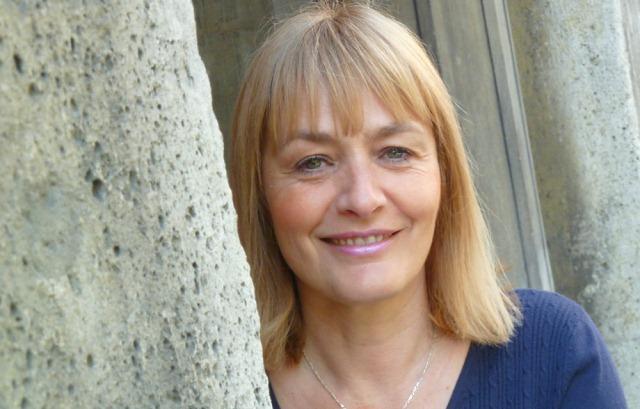 Hans Christian Andersen Award 2024
Croatian Nominee - Writer
Hans Christian Andersen Award 2024
Croatian Nominee - Writer




